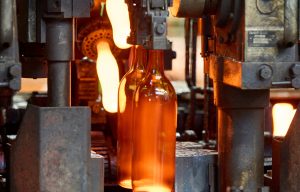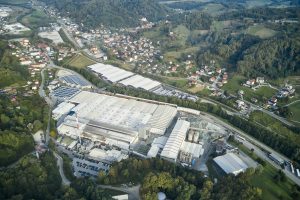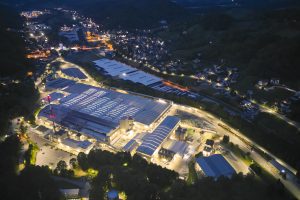With the arrival of Vetropack, we started full of significant investment in technology, infrastructure and in our most important asset – the people.
Over the past 25 years, more than HRK 2 billion was invested in this plant. Today, we are one of the most important pillars of the Group and a highly organized and successful company within the Croatian economy and beyond, for Diplomacy&Commerce says Tihomir Premužak President of the Management Board and General Manager of Vetropack Straža.

Over the past 25 years, more than HRK 2 billion was invested in this plant. Today, we are one of the most important pillars of the Group and a highly organized and successful company within the Croatian economy and beyond, for Diplomacy& Commerce says Tihomir Premužak President of the Management Board and General Manager of Vetropack Straža. At the beginning of September, the only Croatian glass packaging manufacturer Vetropack Straža marked 25 years of joining the Swiss Vetropack Group. What that milestone meant for the factory, but also for the Group?
— To answer this question, it’s important to place this integration in the context of time. In the mid 1990s, we operated almost exclusively in the former Yugoslav market, which disintegrated overnight. In order to survive, we had to look for our place in export (European) markets, at the same time aware of the need to improve the quality of our finished products. Therefore, we had to turn the business “overnight” towards of modernization of the plant, all business processes and finally, the management of the company. For that we needed a strong strategic partner and we found one in Vetropack. We had the knowledge, passion and tradition of glass packaging production, and Vetropack has brought the international know-how, corporate governance, and financial stability. On the other hand, with this acquisition, Vetropack has expanded its business to the growing markets of Southeastern Europe and has established itself firmly there.

2. How do you see the company today, and what would you single out as your greatest asset?
— With the arrival of Vetropack, we started full of significant investment in technology, infrastructure and in our most important asset – the people. Over the past 25 years, more than HRK 2 billion was invested in this plant. Along with modernization of the facility, the next step was to adopt Vetropack’s corporate culture, its way of thinking. Everyone at the plant was aware of the importance to embrace changes, and this was very much reflected in the plant’s progress. Today, we are one of the most important pillars of the Group and a highly organized and successful company within the Croatian economy and beyond. I believe that our greatest asset is precisely the combination of our heartiness and glass manufacturing tradition and the Swiss rational and result-oriented business model.
3. What are the company’s plans in the future and what will you pay more attention to in development?
— Last year, the Vetropack Group launched the Strategy 2030, providing us as a Group and as an individual factory, with a framework for future development. The emphasis of the Strategy is on the strengthening of the existing market position, but we will also focus on expanding into new markets, stronger encouragement of inno-vation and creation of new business models, nurturing a holistic approach to business sustainability with emphasis on continuous reducing of carbon footprint in all our activities and engagement in the value chain with the objective to improve recycling and provision of basic sources of raw materials (primarily used glass). Our ultimate goal is to achieve operational excellence and structural compliance of all processes, especially sales processes and technology/ manufacturing.
4. As a businessman, how do you rate the business climate in Croatia and what is missing to make it even better?
— When you ask the Government and the businessmen the same question, you get diametrically opposed answers. I believe that the truth lies somewhere in the middle. So, the business climate is far from ideal, but it’s also far from catastrophic. Sadly, we have been running in circles for several decades already, constantly talking about the need for structural changes in the society and the economy. However, such an important and powerful step forward requires a strong political will that no state administration has had so far, or has not had enough of it. When and if that happens, the climate will change drastically, and the society and the economy will (finally) move in the right direction. Everything else is just technique – various models of approaches to solving specific economic and social issues and challenges.

5. How satisfied are you with cooperation with the decision makers, the Government, how much they hear the needs of the businessmen and how willing are they to meet your needs?
— This cooperation could be far better than it currently is. I understand the Government: they have to balance between the ideas and desires of the economy and directives from the European Commission. Anyone who thinks that this is simple and that the Government can do whatever it likes is living in delusion and/or ignorance. However, the fact remains that the Government does not appreciate business people (or talk to them) enough, which, unfortunately, is best seen through the recent adoption of the National Recovery and Resilience Plan (NPOO).
6. How necessary is regional cooperation for entrance into third markets and what is changing in the needs of your customers when it comes to new technologies?
— In peaceful times and when the market is stable, you tend notice less the importance of belonging to a group like Vetropack. However, in times of crisis, this can be crucial to the viability of a business. This gives you the security of product placement through already established (group) markets, i.e. a stronger negotiating position when contracting strategic energy sources, raw materials and investment equipment. As for technology development, as well as the ever higher quality standards and sustainability requirements, which are all in fact interrelated, we must follow them because of customer requirements, but also because of ourselves and our competitiveness. We try to react quickly and adapt to this. I expect even more significant changes in the habits of customers, i.e. end consumers, after we completely get out of the corona crisis or after the corona virus becomes accepted similarly to the flu or other diseases.

7. You mentioned the nurturing of a holistic approach as one of the determinants of the Strategy 2030. How is it integrated into your business?
— A sustainable approach is not new to us. It has been integrated into our business operations and our strategy since we first joined the Vetropack Group. It has now been updated as part of the new Strategy 2030. We analyse the impact of our business on all stakeholders and always strive to maintain that balance between profitability on the one hand (owner, customers and suppliers) and social responsibility, environmental awareness and concern for employees on the other.